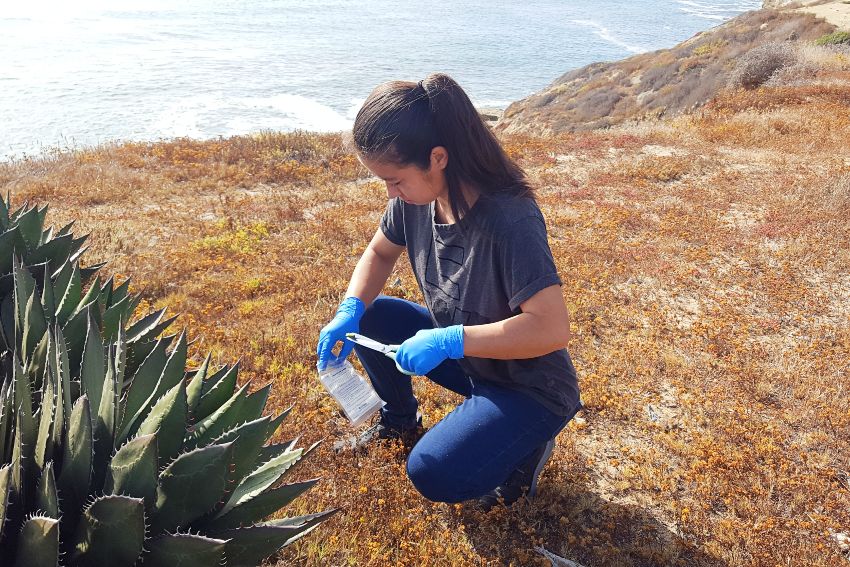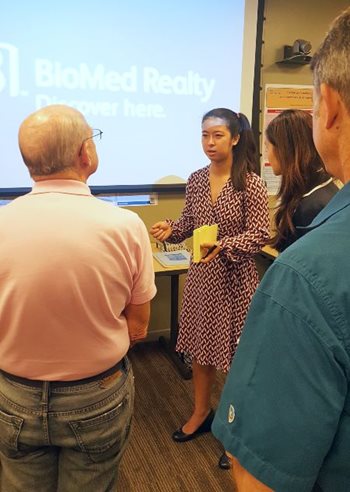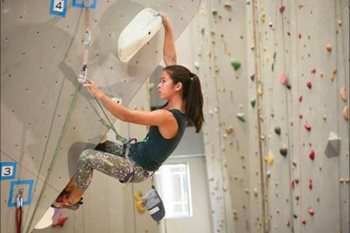20 January 2021
Student’s Research In Summer Program Leads to Co-author Credit in Scientific Journal
By Margaret King
[5 minute read]

For a scientist, being listed as co-author of an article in a peer-reviewed journal for the first time is cause for celebration. Sora Haagensen has the distinction of achieving that milestone based on research she conducted while still in high school.
In the summer of 2019, Sora enrolled in one of UC San Diego Extension's Research Scholars programs for high school students, Molecular Biology Research Immersion. Working with graduate students at Boz Life Science Research and Teaching Institute in Pacific Beach, she studied the genetic diversity of a rare plant called Shaw's agave. After the summer program ended, Sora kept working on the project as a volunteer.
Now she and her fellow researchers have gotten word that an article describing their findings and listing Sora as co-author has been accepted to appear in the journal Ecology and Evolution.
"We were all celebrating in the lab after we heard," said Sora, 18, who graduated in June from the Bishop's School in La Jolla. "I was checking my email constantly until the news finally came in, and I was just really excited."
 A chance for young researchers to shine
A chance for young researchers to shine
Goran Bozinovic, president and CEO of the Boz Institute, said Sora is the first high school student in the program to receive a co-author credit. "Sora was a stand-out…and we are excited that she was an important part of our research team and that her contribution materialized in the published manuscript," he said.
"To be an author…one needs to significantly contribute to a work that has been peer-reviewed by experts in the field and deemed novel and important enough to be shared with the public," he added. "For a high school student, it takes maturity, commitment and persistence well beyond good grades and coursework to accomplish it."
Morgan Appel, assistant dean of Extension's Education and Community Outreach department, said Sora's achievement "is characteristic of the forward-looking spirit that lies at the heart of the Boz Institute partnership with UC San Diego Extension: providing manifold opportunities for talented young researchers to flourish in the lab and in print."
By giving high school students a chance to contribute to meaningful research projects, Appel said, "we advance the research, teaching and service missions of the university and ensure that the future of the academy is in good hands."
Foundation for the future
The experience of seeing the article through to publication has taught Sora lessons that she believes will help her in college and her career. "This has been a very involved process, and it allowed me to learn all about the different stages of doing a research project," she said.
She plans to attend Brandeis University in Massachusetts and major in biology. But first, she is taking a gap year. "I wanted to build my job experience before I went to college," she explained.
Sora has been productive during this break in her schooling despite pandemic restrictions. She has begun working remotely on a research project on ADHD (Attention Deficit/Hyperactivity Disorder) through the Boz Institute. She also helps teach art classes for younger students at the Athenaeum Music & Arts Library in La Jolla, and she volunteers with groups working to protect the Torrey Pines and Scripps Coastal reserves.
 Sora's interest in science emerged early. Beginning in seventh grade, she took part in Fleet Science Center's BEWiSE (Better Education for Women in Science and Engineering) program, which allowed her to tour local biotech and engineering companies.
Sora's interest in science emerged early. Beginning in seventh grade, she took part in Fleet Science Center's BEWiSE (Better Education for Women in Science and Engineering) program, which allowed her to tour local biotech and engineering companies.
Her focus on plant science dovetails with her other interests. An avid rock climber, she relishes spending time outdoors. She also enjoys ceramics, and her creations reflect an affinity for the natural world. "It was a very subconscious thing," she said. "When I did ceramics, my teacher pointed out that all my pieces had an organic quality." She even put together her own independent-study class on native and invasive plants during her senior year at Bishops.
In the field and the lab
When she heard about Extension's summer research immersion program, Sora was eager to enroll. Given a choice of projects, she opted to study Shaw's agave, which grows along the coast in the California-Mexico border region. The agave is endangered because of factors including construction of border fencing and the plant's drawn-out reproductive cycle. "This species takes 20 to 40 years to flower," Sora explained.
She and the other researchers gathered specimens from five sites in California and Mexico. Then they sequenced the plants' DNA and analyzed soil from the sites. The genetic diversity they discovered is a hopeful sign for the species' survival. Their journal article concludes that Shaw's agave "does not seem to be threatened by a lack of genetic and microbial diversity."
In addition to fieldwork, Sora spent time in the lab gaining experience with devices such as a centrifuge and a nanodrop spectrophotometer and learning to analyze genetic material. Jeanne Vu, a graduate student at San Diego State University and a research associate at the Boz Institute, acted as a mentor, teaching Sora lab procedures and overseeing her fieldwork.
At the end of the summer program, Sora presented a poster summarizing the research to a group of industry representatives. She found the experience intimidating but rewarding. "It's important to learn to communicate our findings to the public," she noted.
Sora continues to balance her scientific research with her passion for climbing, a sport she has been taking part in for almost a decade. "Each climb is sort of a problem that you have to solve, and that adds another layer of depth," she said. She has already competed in the youth division of the Climbing National Championship several times, and she has been training on a makeshift climbing wall in her back yard to sharpen her skills.
Sora speaks enthusiastically about her experience in Extension's summer research program. "It has given me a start in working in the lab and all the aspects that come with that," she said. "It definitely lived up to being an immersion program. I have so many good things to say about it."
She eagerly recommends the program to other students. "Everyone has a different project – the diversity of the research really helps," she said. "High school students interested in being in a lab can find something there and learn a lot from the experience."